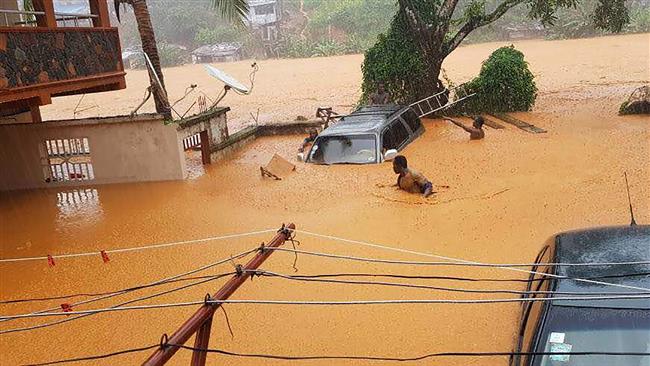400 bodies recovered from Sierra Leone landslide
The death toll from massive landslides in Sierra Leone has reached almost 400, with hundreds of others still missing, authorities say. The Red Cross confirmed the toll on Tuesday, saying government figures had indicated “that there have been 400” bodies recovered.
Hundreds of houses in the capital, Freetown, were buried while their residents were asleep early Monday morning, after a part of Sugar Loaf mountain collapsed following heavy rain.
Dozens of houses were buried in the worst hit town of Regent when the hillside collapsed. People who survived the disaster are still hoping to find their loved ones alive.
Laura Ngo-Fontaine, a senior communications officer for the Red Cross, said 600 other people were missing in the area and that the organization continued the search and rescue operations.

Meanwhile, bodies continued to arrive at Freetown’s overwhelmed central morgue. “Our problem here is space,” said Owiz Koroma, the head of the morgue, who also speculated that the death toll would increase further.
“We are trying to separate, quantify, and examine quickly and then we will issue death certificates before the burial,” he said. Witnesses said bodies could be seen lying on the ground outside the building due to the lack of room.
Government spokesman Cornelius Deveaux said they were prepared to bury the bodies in four different cemeteries across the capital. Deveaux said the burials were expected to take place on Thursday.
Doctors without Borders, also known by its French acronym MSF, which is an international medical humanitarian organization, is providing hundreds of body bags to the government. A day after the flooding hit the country, President Ernest Bai Koroma issued a desperate appeal for international help. Visiting the site of the disaster, he said, “Entire communities have been wiped out. We need urgent support now.”

He also promised relief to the more than 3,000 people left homeless, opening an emergency response center in Regent. Sierra Leone’s Red Cross Society spokesman Abu Bakarr Tarawallie, meanwhile, warned of disease outbreaks as he estimated that at least 3,000 people were homeless and in need of shelter, medical assistance, and food.
“We are also fearful of outbreaks of diseases such as cholera and typhoid,” he said. “We can only hope that this does not happen.” Following floods and mudslides, deadly diseases like cholera and diarrhea are highly possible due to contaminated waters spreading.
Two years ago, Sierra Leone — one the world’s poorest countries — was hit hard by a deadly Ebola outbreak. The epidemic killed more than 4,800 in the country.
Source: Presstv





